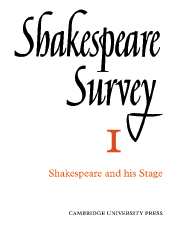Book contents
- Frontmatter
- Studies in the Elizabethan Stage since 1900
- Titus Andronicus on the Stage in 1595
- A Note on the Swan Theatre Drawing
- The Bankside Theatres: Early Engravings
- Shakespeare and the Blackfriars Theatre
- Shakespeare’s Bad Poetry
- The Folger Shakespeare Library
- The Heritage of Shakespeare’s Birthplace
- Three Shakespearian Productions: A Conversation
- Four Lears
- London Productions
- Stratford Productions
- International News
- The Year's Contributions to Shakespearian Study 1 Critical Studies
- 2 Shakespeare’s Life and Times
- 3 Textual Studies
- Books Received
- Index
- Plate section
Shakespeare’s Bad Poetry
Published online by Cambridge University Press: 28 March 2007
- Frontmatter
- Studies in the Elizabethan Stage since 1900
- Titus Andronicus on the Stage in 1595
- A Note on the Swan Theatre Drawing
- The Bankside Theatres: Early Engravings
- Shakespeare and the Blackfriars Theatre
- Shakespeare’s Bad Poetry
- The Folger Shakespeare Library
- The Heritage of Shakespeare’s Birthplace
- Three Shakespearian Productions: A Conversation
- Four Lears
- London Productions
- Stratford Productions
- International News
- The Year's Contributions to Shakespearian Study 1 Critical Studies
- 2 Shakespeare’s Life and Times
- 3 Textual Studies
- Books Received
- Index
- Plate section
Summary
[A paper read at the Shakespeare Conference, Stratford-upon-Avon, August 1947. Two portions delivered on that occasion have been omitted.]
In my book, The Enchanted Glass, I endeavoured to emphasize the intense expressiveness of the English Renaissance, in accordance with the belief current at that time in the power of expressed truth. If these opinions should be called in question, it is only necessary to point out that rhetoric was the central core of Renaissance education and the very foundation of virtue. The power of speech distinguished men from the brutes, and rhetoric was the symbol of man’s dignity. We know that the persuasive aim of ancient rhetoric had also been transferred to poetry. The object of humanistic education, as stated by my pupil Dr Madeleine Doran, was to prepare men to use rational discourse and persuasive eloquence in the service of truth and the public good. In this aim rhetoric and poetry came together. Poetry sought to teach with delight and to move men to great achievement, and, since the medieval conception of rhetoric as merely the ornamental aspect of discourse still prevailed, poetry in some sense superseded rhetoric, inherited the ancient estate of rhetoric, and itself became a primary agent for moving men to rational thought and virtuous action. The word itself was irresistible. Of course schools fell far short of their ideals, and rhetorical doctrine suffered mechanization. The whole paraphernalia of the divisions and patterns of oratory were ruthlessly applied to all discourse—to the composition of letters, to the writing of history, and even to the writing of poetry itself. Thus rhetoricians, or general teachers, saw the problem of drama, epic, and lyric in terms of oratory, its divisions and its style.
- Type
- Chapter
- Information
- Shakespeare Survey , pp. 51 - 56Publisher: Cambridge University PressPrint publication year: 1948

